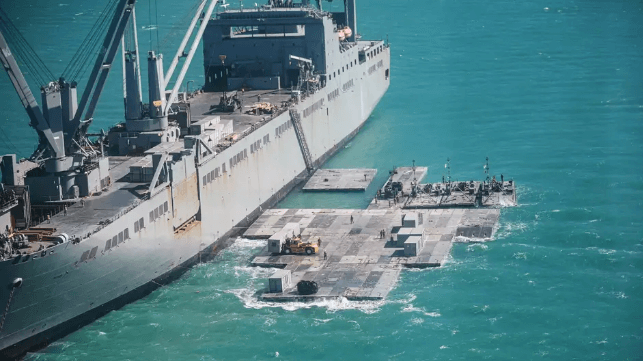Republican Senators Question Biden's Maritime Aid Plan for Gaza

A dozen Republican senators have expressed unease about the White House's plan to install a floating pier off the coast of Gaza for food shipments, saying the risk to American servicemembers is too high. Their concerns run parallel to criticism leveled by the humanitarian aid community, which has panned the maritime pier as an insufficient and unnecessary response to the growing famine in Gaza.
In a letter to the White House, Senators Roger Wicker, Tom Cotton, Deb Fischer, Dan Sullivan and eight colleagues asked the Biden administration for clarification on how the pier will be operated - or whether it should be at all. They questioned the rationale for a maritime aid corridor, when thousands of aid trucks are already waiting to get into Gaza, and asked if building a delivery pier was worth the risk to American lives.
"We are gravely concerned that the Department of Defense has given too little consideration to the likelihood that Hamas, Palestinian Islamic Jihad (PIJ), and other U.S.-designated terrorist organizations operating in Gaza would attempt to attack the U.S. personnel that will be deployed to this mission," the senators wrote.
They noted that other Iranian-backed proxies have attacked U.S. servicemembers in the Mideast, and suggested that Hamas was likely to do the same thing - even if it meant attacking a food convoy for Hamas' own people.
Even if adequate force protection measures for American troops were in place, the possibility of inadvertently transferring aid to Hamas would still exist, they warned.
"There is no apparent plan to secure distribution, to keep aid in civilians’ hands and out of Hamas’. The latter would provide Hamas sustenance to continue fighting," the senators wrote.
Aid groups pan U.S. maritime corridor
The UN and leading food aid groups have warned that the temporary pier will be too little, too late to stave off imminent famine in Gaza. Thousands of food trucks are already waiting at land checkpoints into the territory; the UN says that the challenge is that they are held or blocked.

that matters most
Get the latest maritime news delivered to your inbox daily.
Through security measures, Israel has limited crossings to about 200 trucks per day, down from 500 aid trucks per day before the start of the military operation. The de facto limitation of cargo transfer has drawn condemnation from the UN and the human-rights community, and the criticism has begun to shift towards stronger allegations.
About half of Gaza's 2.2 million people face catastrophic food insecurity, according to the Integrated Food Security Classification (IPC) system. The body warns that "all evidence points towards a major acceleration of deaths and malnutrition" in the months ahead.
